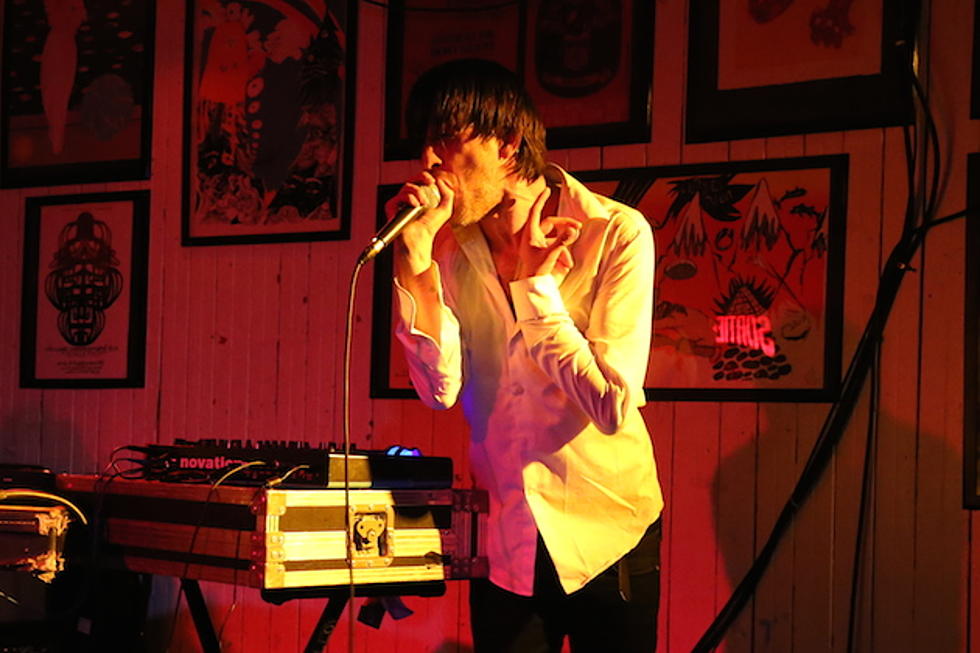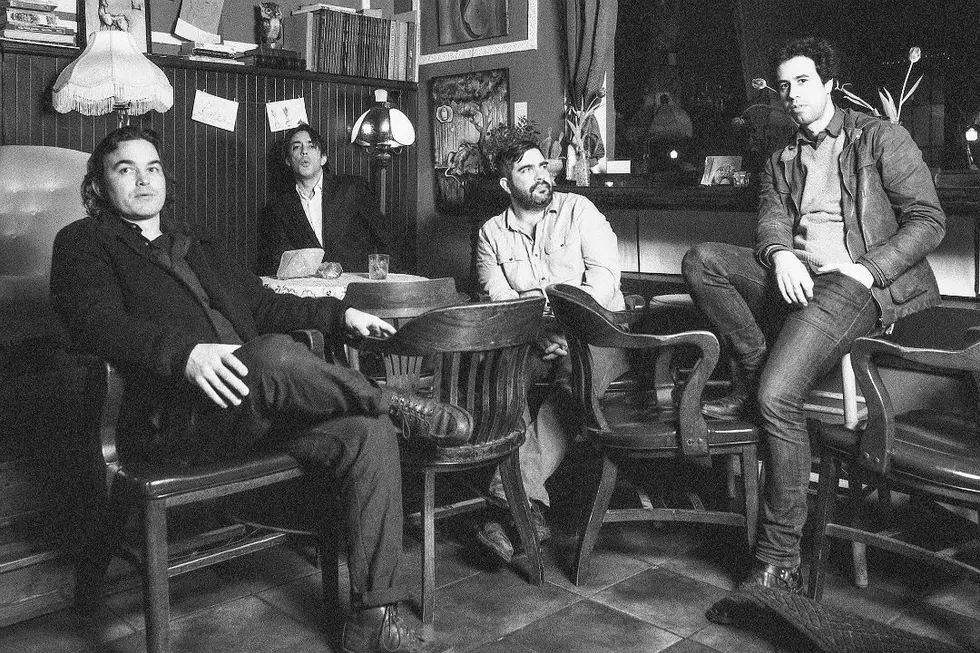
Dan Boeckner of Operators + Wolf Parade: ‘There’s a Beauty In Starting Over’
Dan Boeckner puts on a suit jacket when he writes songs for his newest project, Operators. It certainly fits the sleek, dance-club-ready sounds of the band's first release, 2014's 'EP1.'
Fans who know Boeckner's work with Wolf Parade probably don't think "dance club" when they hear his name. It was as one of the leaders of that band that Boeckner developed a reputation as a writer of emotive rock ballads colored in with flourishes of vacuum-tube synths. Observe 'This Heart's On Fire' or 'Language City' -- fist-pumping rockers on the order of Springsteen, touched by New Order and the Pet Shop Boys.
The music Boeckner's made since Wolf Parade split in 2011 has blown up different elements of that style. 'Civilian Stripes,' for example, is a churning acoustic pop song from Divine Fits, his project with Britt Daniel of Spoon. 'Repatriated,' on the other hand, by Boeckner's band with Alexei Perry, the violent, foreign-inflected Handsome Furs, is full of fuzzy synths and drum machines and seeps with transnational claustrophobia. But in each expression, Boeckner brings it all back for a thrilling chorus.
In some ways, Operators grew out of the ashes of Handsome Furs, which dissolved after Boeckner and Perry's marriage fell apart. Like the Furs, Operators are electronic music with a human spine. With Operators, some of the heaviness of Handsome Furs has evaporated, but the intensity is intact -- largely thanks to Boeckner's co-conspirators, electronic mastermind Devojka and secret-weapon drummer Sam Brown, of Divine Fits and New Bomb Turks.
Operators' hurricane live performances also set them apart; Montreal buzzed for days after Operators' ecstatic set at M for Montreal a few weeks back. The band played several shows before they put out their first EP, letting word of mouth spread about the music before anyone had the chance to actually hear it. In some ways, this is about Boeckner, now something of an indie rock elder statesman, being able to do things his way. "There's a beauty in starting over," he says. "The thing that got me into music was total connection with the audience."
Through it all -- with renewed freedom, new sounds, and fresh faces -- Boeckner still brings it back to the chorus. We talked with Boeckner about all this and more -- including why the members of Wolf Parade butted heads, and when to expect new Operators music.
So you're demoing some new Operators stuff now?
Yeah, yeah. I've been working at home, when I've had time off just with the sequencers. Which is how I write for this band, really -- it's all analog drum machines and sequencers and then we strip all the sequenced parts out and put in different machines and play it live. So, I've been doing that -- getting skeletons of songs put together. And then Sam is set to fly out so we can have a writing session before we go on tour with Future Islands. So yeah, I've been demoing.
Did you write the music together for 'EP1'?
Well, we recorded 16 songs in Montreal in February and March of last year. At that point I think the band had been together for like eight months, and we were like, "OK -- time to record." We had 16 songs, including one cover, and we recorded everything that we had. Afterwards, we started doing shows, and we signed to Last Gang, and decided we wanted to put a series of EPs out, of which one is out. As we played the songs live, we were like -- actually, these songs have kind of evolved. So we decided we'd pick the best stuff of the 16, put them out on EPs, and then go in in February and March and record a full length record with new songs.
So you're still going to put the EPs out -- you're not going to skip the EPs and cut to the LP?
I think we're gonna put the EPs out. We're at least putting one out before the record comes out, probably in January. It'll have four songs on it.
'EP2,' I would assume.
Yeah, 'EP2.' [Laughs] As for the writing -- when the band started, most of it was just stuff I'd assembled, and brought in Devojka to do some arrangement and work on drum patterns, basically, and drum synthesis, because I was using stock drum stuff, and she came in and started tweaking it and arranging stuff with me. And then Sam came out and started playing drums and that changed the entire vibe. Like, I always knew it was going to be Sam, Devojka and me. But when we all started playing together in a room, when it stopped being conceptual, that was when everybody had this moment that was like, "Oh, this is what the band sounds like."
Yeah, I mean, Sam is such a core part of the sound.
Yeah, he's amazing. Dev and Sam both have backgrounds in songwriting, you know -- Sam plays keyboards, he can play guitar, he's got a beautiful voice, which we don't utilize in the band. [Laughs] And Dev is great at programming, is a pretty kickass guitar player, has a great voice and is great at writing songs. [On] 'Start Again' ... Sam brought in a bass line, which is the main bass line that goes through the song. He recorded it on his iPad, and we sequenced it on Analog Four, he came up with the drum beat, and I came up with some temporary electronic percussion. And then I made Dev and Sam leave the practice space for a couple hours. When they came back, I had the chorus and the lead melody line to go over the chorus with the keyboard. Then, they tore that arrangement apart and wrote a bridge.
I'm familiar with Sam's background, but this is the first time I've heard Devojka. And I know she's a huge piece of this project. When I saw you live, it was obvious how much of the music is her. How did your collaboration come about?
I met her like six or seven years ago in California, she was playing in a band. She was basically filling in for someone in this band. And two years later, I played a Handsome Furs show in Macedonia at this ... youth center that was built in the '60s after the earthquake. It was a dream show for me, to go play Skopje. We played everywhere in ex-Yugoslavia. Skopje was always a place I wanted to get to, but it's so isolated from everything. So we went and she was there, and she was like, "I'm opening the show!"
She has a solo project that's just called Devojka -- that's her thing. And she'd been getting radio play on Kanal za Trojka, the radio station there, and most of the people at that show had shown up to see her, because she was on the radio and she's local. And it was amazing. We stayed in touch, I saw her every time we went to Skopje, we'd hang out and talk about music, and when I was putting this band together, I found out she moved back to California. I was like, "Hey, I have this project. Let's do it."
My sense from reading some interviews with you around the time 'EP1' was new was that you were having a lot of fun because you'd just finished Divine Fits -- where the music was a little more cathartic and you were working out some personal things -- and this was less of that.
I think I literally said that in a couple of interviews. Yeah, that's absolutely true.
Is that still where your head is at with this project?
Yeah, definitely. It's funny -- I can kind of place my psycho-geography for pretty much every record I've ever made. I think it's going to come out in every record. I mean, when the last Handsome Furs record came out, 'Sound Kapital,' I wasn't exactly at the happiest point in my life, but I also felt kind of liberated in that I'd been spending a lot of time either in Eastern Europe or in Southeast Asia and China, and that really drove me forward to write. A lot of the stuff I saw and experienced made me angry, and a lot of that came out on the record -- it's a super political record.
'Sound Kapital,' you mean.
Yeah, I think 'Face Control' was kind of pointing toward that, and then 'Sound Kapital' was [written in response to] the financial collapse and austerity measures and control. And then I was writing a new Handsome Furs record, and my marriage just self destructed. I was in L.A. doing writing sessions with Britt [Daniel] for Divine Fits, so Divine Fits were definitely working through a break up. It's like a classic break-up record. Then, touring it, those songs stopped being painful. Even though they were coming from the same place emotionally, the more I performed them, the more cathartic it was. So by the time the Divine Fits thing wrapped up, I was in a pretty good headspace.
And when the Operators thing started up, I just didn't feel like there were any limitations on it. I didn't need to put it into some kind of aesthetic box, or have an overarching theme for it. I just wanted to see what came out, and it was a joyful experience. And writing dance music, too -- that was something I was trying to approach with Handsome Furs, and this combination of people in Operators, everything just kind of clicked for that type of music.
The Operators thing kind of strikes me as a different costume that you're wearing. I'd written in my review of the show that there was something sort of "Prince-like" about your performance.
That was a huge compliment.
But I picked up on that, because having seen Wolf Parade, too, it felt like this music was bringing something totally different out of you.
Yeah, yeah. Every band that I've been in, all the songs that I write, it's all coming from me. And there are certain things that I like that I will always come back to -- common threads in each band. Like, I like a chorus. [Laughs] I'm a fan of a chorus. Or, like -- there's a style over the last 10 years that's settled in for my songwriting, no matter what format it's in, whether it's guitar or synth.
I've always liked engaging with the audience -- not restricting myself emotionally while I'm performing. Which is exhausting. I can understand why people go onstage and play perfect versions of the songs on their album and it's static but technically excellent, beyond anything I could do in a live setting. But I think the commitment to giving everything of yourself in a performance -- whether it's in Wolf Parade, yelling until my voice is a gravel pit, or in Handsome Furs, it was like physically injuring myself every other time we played. In this band I found a new way to channel that. You have to connect with the audience. You have to.
I definitely pick up on that. One thing I think everyone has picked up on is that you guys played shows before you put out music. And you've played a lot of shows since. You are out building a reputation through your live shows before you have any music out. So when people talk about you they say, "Oh, I saw them in Montreal and it was an amazing experience," instead of, "Oh, you need to go listen to this album on Spotify."
Yeah. I don't know, the idea of waiting around for somebody to knight you with some internet coins, or internet cred or whatever, seems just totally dumb to me at this point. [Laughs] I've been in a bunch of bands -- that sort of media space, I've inhabited that space. Younger newer bands -- that's for them. It's not for me. I like doing interviews and I like when people have nice things to say about the shows or the record, but I didn't think there was any reason to trick people into paying attention to this. I just wanted to go play shows and have everything else follow. It was a gamble but I think it paid off.
Well, and you know you'll have a certain amount of bodies in the room, at the beginning. It's hard to build an audience if you don't have anyone in the room in the first place.
Exactly. The trick is just to build off the people who already know, you know? I don't want to just play for Wolf Parade fans. It's nice with Operators where we'll play a show and then people will come by the merch table and go, "Oh, s--t! You're the guy from Handsome Furs," or Wolf Parade, or whatever. And I like that, that makes me happy. But when we started doing these live shows before the record came out, we did have people coming because Sam has been in bands before, and I have been in bands before.
Right. But it's not like you're out there doing acoustic versions of Wolf Parade songs.
No!
But there is a likelihood that you could have someone who might like this music who doesn't like Wolf Parade, so it could work against you, too.
Yeah, that's true. That's absolutely true. It's a balance, right? And just because you've been in a band people like or two or three bands people like doesn't mean you're going to be playing the same sized venues at the beginning of your career. I think people who do a bunch of different projects sometimes get frustrated by that. They'll go with their first band and play two Terminal 5 shows in a row, and then they'll put all this heart into a project and go back to New York and hey, they're doing Mercury Lounge.
But I also think there's a beauty in starting over, or building something up again, building another project. Because it really connects you with the thing you got into music for in the first place -- or for me, the thing that got me into music was total connection with the audience.
Right. It sort of goes back to what we were talking about before -- you get to start fresh with no expectations, with a difference face. It's not like going out with Wolf Parade where everyone expects you to do 'This Heart's On Fire' every night.
Yeah, that's true. I get to play songs that are new. But if I were to go back out with Wolf Parade, I would joyfully play 'This Heart's On Fire,' because I love that band. Just like if Divine Fits goes on tour again, I'm going to love playing 'Shivers,' because I love playing that song with Britt and Sam and Alex [Fischel, keyboardist]. It's nice to wear several different hats. I think it makes sense with the economic [reality] of being a musician right now, too.
Because otherwise you're just absolutely tied to this album cycle, where you spend an enormous amount of time and money putting together an album and then touring it and then timing it so you can hit all the money festivals. And then when it's over, you go back to writing or you take time off, and you're not working. I don't like not working. I don't like not having anything to do.
You also have to be compatible with the people in your band, and it sounds like you and Sam and Dev are very compatible. You can have the best band in the world, but if the members aren't compatible, it won't work. They're going to get a reputation that they're difficult to work with.
Well, dude -- Wolf Parade. The first five years of Wolf Parade. [Laughs] Spencer [Krug] and I -- he's one of my best friends in the whole world. He's like a brother to me. So are Arlen [Thompson] and Dante [DeCaro]. Over time, we got older and a little more mellow, less crazy. But at the beginning of that band, there was always tension between him and me over method, execution, everything. And he would have probably said I was difficult to work with and I would have said he was difficult to work with.
I'm friends with a lot of people who are considered "difficult to work with." I think there's a difference between being difficult to work with and just being a straight-up piece of s--t. I think often people who are genuinely amazingly talented and maybe challenging to work with get lumped in with people who are actually difficult to work with and are complete pieces of s--t. Challenging is maybe a better word -- you know? It all kind of works out.
Do you and Spencer talk about getting back together, or is that totally off your radar?
We talk. We hang out. Yeah. [Laughs]
But you're not currently planning a Wolf Parade World Comeback Tour?
Nah. Not yet. No.
When you're writing -- assuming you're coming up with ideas for songs all the time -- if you come up with something that's a little more emotionally revealing, a little more emotionally earnest, do you set it aside for a project like Divine Fits? Or do you try to make it work for Operators?
You know, really what I do is I set out a block of time and I say, "I'm writing for this band," and whatever comes out is in the format of that band. You know, it really comes down to the equipment that you're using, and the way you approach it. When Handsome Furs and Wolf Parade were running simultaneously, I would write for Wolf Parade and I would put myself in a Wolf Parade state of mind. I also wouldn't try to save anything for the Furs or vice versa, because I knew that if I brought something to Wolf Parade, Spencer would play in the way that he plays, and Dante would play, and Arlen would play, and it would become a Wolf Parade song, as long as I was being honest with myself when I was writing. Same goes for Handsome Furs, and Divine Fits, and Operators. I think where it gets tricky is if you go into writing with a bunch of pre-conceived notions of what you want it to come out like -- what it's "for." That's a bad move. [Laughs]
I couldn't imagine a song like 'Ancient' working for any of your projects except this one.
No. It doesn't live in the Divine Fits universe. And maybe that's how I get to do a different persona. I do this thing with Operators when I go into the studio where even if I'm just by myself, if I'm writing a piece of music, I put a suit jacket on.
Like, you literally put on a suit jacket?
Yeah! The studio I've been writing in is not, by any means, a fancy place. It kind of smells like mold, and there are no windows.
This is the canning factory in San Jose?
Yeah. The lighting is terrible. It's basically a concrete cube with some synthesizers and carpet on the floor and this big PA and a sub. And I guess the suit helps me get into character, so to speak. Or -- it makes me feel like I have a purpose.
But as for 'Ancient,' yeah, that song was written on a sequencer with just like a kick drum and a snare drum, and then a bass. That was how the song started. It's the main chord progression that goes through.
I was reading a bunch of Phillip K. Dick and I wrote this thing about dropping acid when I lived in Cowichan Lake [Boeckner's hometown in British Columbia] and I was just like, "I'm going to write a narrative about parallel timelines." Basically it's just us playing a song about where I grew up, and time travel. [Laughs] That was the mini-format I came up with for that song. And I remember writing it, and just really enjoying listening to it, and then I brought Dev in and she wrote a bridge and then we brought Sam in and it became a thing. That was one of the first things we wrote. I was pretty happy about that.
Have you played any of the songs you're demoing now live?
No. This is all new-new stuff. There are the five songs from the EP, two or three of which we play live, and of the other 11 songs we recorded in Montreal, we play a lot of those live as well.
You get compared to New Order and Depeche Mode in just about every article that's written about you. Is there an element of "retro," for lack of a better word, in what you do?
New Order are always going to be a key influence for me. I don't think I can be in a band and not reference that band or think about that band when I'm writing -- that band has been built into my musical DNA as much as Sonic Youth have been built into my DNA. Those are two huge bands for me. One of the things I learned from New Order is that you don't need more than two chords to do what you do. You know?
Right. Or they'll have one melody in a song but the chords are different from verse to verse.
Yeah! Which is a technique that I've liked to use since Wolf Parade. 'This Heart's On Fire' has a descending melody line and it goes through major chords but when the melody line stays the same and the chords switch to minor, there's this nice pull. You know? This melancholic pull. New Order are really good at that.
But 'True,' 'Ancient,' and there's this song called 'Ecstacy In My House' that is one of my favorite songs that Operators wrote and that's going to come out on the EP, that stuff is referencing early acid house, but it's got chord changes and more of a narrative vocal structure to it. So I don't know, it's not a conscious effort to be retro. We just said, "This is the equipment we will be using for this project. There will be a guitar, there will be these sequencers, and these drums, and we're going to work within this framework." Otherwise, there aren't a lot of aesthetic rules.
More From Diffuser.fm









